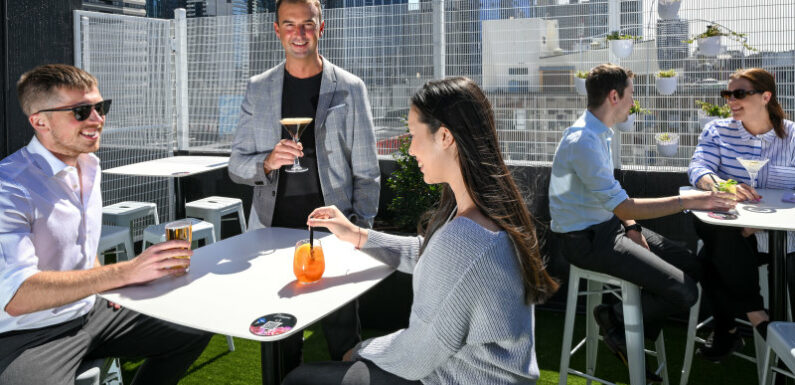
A wave of late-night venues could pour into Melbourne this year after a 15-year ban on new licences for serving alcohol after 1am is lifted in a few months.
The City of Melbourne will consider a review of its planning policy on Tuesday night as it prepares for the state government to end the late-night liquor licence freeze on July 1.
Alex Blanco of the Pullman hotel at the venue’s newly opened rooftop bar, Blossom. Credit:Eddie Jim
Penny Miles, chair of Melbourne’s nighttime economy advisory committee – or the “night mayor” – said the end of the freeze was a huge opportunity to “get the city pumping through the night”.
Miles said hospitality businesses were gearing up to apply for late-night licences.
“Negotiating licenses and setting up for them does take a little bit of time, so I don’t think it’s going to be a floodgates situation, but it’s definitely going to be an opportunity,” she said.
She said that while some exemptions to the 1am cut-off had been available since the freeze, they were “as rare as hens’ teeth”, so she expected great interest in late-night licence applications.
“Every little increment is important,” she said. “But it does need a delicate balance with amenity and safety.”
In particular, the council must balance the city’s nighttime economy with the needs of residents in the CBD and Docklands, where the residential population has more than doubled in 10 years, from 28,011 in 2011 to 59,765 in 2021.
“The pressure on government to refuse planning and liquor applications for late-night venues has increased with that population growth,” the council’s briefing papers say.
The council will consider introducing a definition for “noise-sensitive areas”, bringing the decision-making guidelines used by Liquor Control Victoria into part of the Melbourne Planning Scheme and requiring planning permits for bars and nightclubs in Docklands.
Patrons at the rooftop bar at the Pullman hotel on Monday. Credit:Eddie Jim
One of the newest additions to Melbourne’s late-night scene is rooftop bar Blossom, which opened on the 14th floor of the Pullman hotel in February.
Alex Blanco, marketing manager at the Pullman, said the venue was “quite blessed” that, as a hotel, it could operate under a late-night liquor licence with the only restriction being that no music play on the outdoor balcony after 1am.
“If the demand is there – and it looks like it really is from what we’ve seen – we certainly will open up as late as we need to,” he said.
Blanco said the rooftop bar had avoided complaints by operating under the philosophy of “love thy neighbour”.
Penny Miles, Melbourne’s “night mayor” says exceptions to the late-night licence freeze have been rare. Credit:Simon Schluter
“We are also a hotel, so we’re never going to sabotage the number one thing we do, which is looking after guests in a hotel, by playing music that’s screaming and overly loud or anything like that,” he said.
“We are certainly not a nightclub so we’ve had nothing but positive feedback from our neighbours.”
Before the council meeting on Tuesday, councillor Rohan Leppert said the city needed to ensure guidelines for late-night venues were clear.
“The undefined term ‘noise-sensitive’ in our current policies is wildly unhelpful,” he said. “The purpose of these exercises is to inject a bit more certainty into the system.”
Leppert said that without clarity, applications for late-night licences were likely to get litigious.
The Residents 3000 group opposed the end of the liquor licence freeze due to concerns late-night venues would affect the city’s amenity.
“It’s about what is important for the health and safety of the community,” the group’s president, Rafael Camillo, said. “We have much more late-night venues than we had in 2008 [when the ban was put in place], so it is not like there is a lack of places for people to go.”
The Police Association is also concerned about the end of the liquor licence freeze.
Secretary Wayne Gatt said the union was “naturally wary” as the Andrews government has announced public intoxication laws will be replaced with a health-led response by November.
“We are particularly concerned because of the state’s approach to the reform to public drunkenness,” he said. “Its ill-preparedness for that reform means … any extension to trading hours in the city puts more pressure on the system and it will occur in an environment when police have fewer tools to deal these issues than ever before.”
The Morning Edition newsletter is our guide to the day’s most important and interesting stories, analysis and insights. Sign up here.
Most Viewed in National
From our partners
Source: Read Full Article


